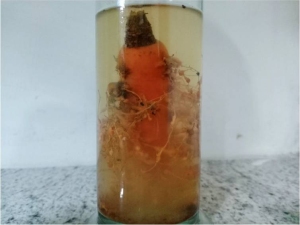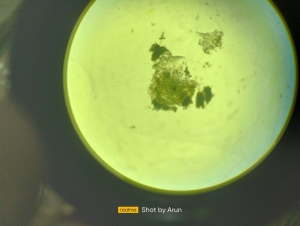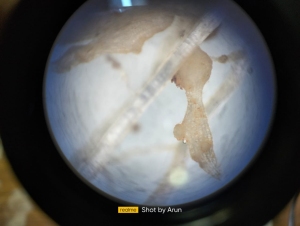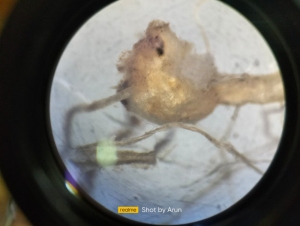The Division of Plant Protection encompasses Agricultural Entomology, Plant Pathology, Plant Nematology and Sericulture. The main vision of the Plant Protection division is imparting teaching, research and extension activities. Plant Protection plays a vital role in fulfilling targets of crop production. The thrust areas of plant protection are encouragement of Integrated Pest Management, Integrated Diseases Management, Integrated Nematode Management ensuring availability of safe and quality pesticides for sustaining crop production from the ravages of pests and diseases.
The main goals are,
Department of Agricultural Entomology under the Division of Plant protection of Adhiyamaan College of Agriculture and Research is now completing seven years (as on November, 2022) of unique activity imparting to undergraduate students teaching, research and extension on Agricultural Entomology and also advisory services to farmers. The department has begun with fundamentals of entomology and taxonomic studies on various insects and then drawn to the studies on management of beneficial and harmful insects with special emphasis on sericulture, apiculture and pest management of field and horticultural crops. On 5th May 2019, Insect museum was established to create interest and arouse the curiosity among the undergraduate students. Further, a bio-control production unit was started in August, 2022 and the department involved in mass culturing of bio-control agents viz., Trichogramma, Bracon and Cryptolaemus montrouzieri. Apart from that, the department is maintaining beekeeping with six Indian honeybee colonies to provide agricultural education to the student’s during the classes and also trainings to rural youths and the progressive farmers.
Our department has well furnished facilities which meet the requirements to impart knowledge on agricultural entomology to under graduate students. Our laboratory comprises of 320 insect collection boxes, 120 insect display box, two storing cabinets, more than 50 wet preserved specimens, 11 compound microscope, 55 dissection microscope, weighing balance, pH meter, refrigerator, beekeeping equipments, silkworm rearing appliances, by-products of sericulture and lac insect products, Pesticides container, insect traps, lab chemicals, Soxhlet apparatus and glass wares.
Department of Agricultural Entomology established abeekeeping unit (six Indian honeybee colonies)in 2017 at Adhiyamaan College of Agriculture and Research. It mainly focuses on providing knowledge to students and farmers on bee keeping. There are five important species of honey bees; the rock bee (Apisdorsata), Indian bee (Apisceranaindica), little bee (Apis florae), European or Italian bee (Apismellifera) and Dammer bee / Mosquito bee (Meliponairridipennis). Under the Sweet revolution, the focus is on beekeeping through scientific methods and the production of quality honey and other beehive products. The Sweet Revolution is related to increasing the income of India’s small and marginal farmers.Though the honeybees are best known for their economic role in nature, it is to pollinate hundreds and thousands of flowering plants and assure setting of seed or fruit. Honey bee pollination also improves the quality of produce. The potential benefits due to bee pollination, in the form of increase in yields of various crops. In addition, it does not require huge investments, infrastructure or even fertile land to start bee farming in India. In agriculture, honey bees do not compete with the crops for resources. On the other hand, it helps increase agricultural productivity.
Department of Agricultural Entomology has established the Biocontrol unit in 2021 at Adhiyamaan College of Agriculture and Research. The main aim of Biocontrol unit is to provide knowledge to the undergraduate students through teaching and culturing on Trichogramma, Bracon and Cryptolaemus montrouzieri. Moreover, awareness on Entomophages was given to the farmers.
Sericulture is under the Division of Plant Protection; it primarily caters to knowledge of undergraduate students through teaching. Basically, sericulture is an agro -based cottage industry suitable for all the land holders. Contrasted with agriculture crops, sericulture provides more employment round the year and extremely labours intensive, low capital investment, short conception period; high profit oriented and less input indoor activity that gives frequent periodicity of high economic returns to the rural farm families. In India there are four types of silk produced like mulberry silk, tasar silk (temperate and tropical), Muga silk and eri silk. In Tamil Nadu among the districts particularly Krishnagiri is a hotspot site of mulberry bivoltine raw silk production because of prevailing blessing agro-climatic condition. The district has Tamil Nadu Sericulture Training School, Central Sericultural Germplasm Resource Centre and P2 Eri silkworm seed production centre, Central Silk Board, Hosur, Krishnagiri district. 0.25 ha were maintained mulberry garden at Adhiyamaan College of Agriculture and Research for educational purpose and also having a small scale rearing shed about 100 dfls capacity.
On 11th December 2019, training on eri silkworm rearing was conducted by the department of Agricultural Entomology in association with the department of Agricultural Extension. The two chief guests have invited Dr. C. M. Kishore Kumar, Scientist-D and Dr.K.Velayudham, Scientist -D from P2 Eri silkworm seed production centre, central silk board, Hosur. He briefly explained about castor cultivation and eri silkworm rearing. Totally 30 farmers participated in the training on eri silkworm rearing, ACAR, Athimugam. At the end of the session, the scientists have concluded that, in Tamil Nadu climatic conditions, especially traditional silk growing areas like Dharmapuri, Krishnagiri, Salem and Erode districts, were highly suitable in Ericulture.
Sericulture section having well capable of rearing tray, incubation frame, black boxing cover, bed cleaning nets, plastic tray, bamboo Mountages, plastic Mountages, leaf chopping board, knife, rotary Mountages etc.
As per 2017 syllabus, there are four compulsory courses and two experiential learning courses and one project work.
Semester 3: AEN 201 Fundamentals of Entomology (2+1)
Semester 4: AEN 202 Management of Beneficial and Harmful Insects (2+1)
Semester 5: AEN 301 Pests of field crops and their management (1+1)
Semester 6: AEN 302 – Pests of Horticultural crops and their management (1+1)
Semester 8: AEN 452 Commercial Bee keeping (0+10)
Semester 8: SER 451 Commercial cocoon production (0+10)
Semester 8: APW 401 Project Report Preparation, Presentation and Evaluation (0+1)
Nematology is under the division of Plant Protection, mainly focusing on imparting knowledge to undergraduate students through teaching. Tamil Nadu is the first state to realize the vitality of nematodes in the Agricultural and Horticultural crops. The Krishnagiri district particularly Hosur, Shoolagiri, Bagalur and Berigai area have an intensive cropping system to cultivate vegetables viz., Tomato, Brinjal, Bhendi, Beans, Cabbage, Cauliflower, Beetroot, Carrot and Potato etc. This site highly infested by the root knot and cyst nematode in vegetables. The Nematology section creates awareness of nematodes to the farmers and also to give remedy on how to control nematodes in the field level.
Nematology section has a well equipped laminar air flow chamber, sieves, slides, Hemocytometer, Stereomicroscope, Autoclave, preserved specimens, chemicals and glassware etc.
A field demonstration was conducted by the department of plant protection, ACAR at Berigai village to educate the vegetable growing farmers about integrated nematode management in carrot, potato, brinjal and tomato on 10.02.2021. About 30 farmers from Berigai village attended the field demonstration programme. During the programme, the lecture on the nematode management was given and stressed the advantages of egg parasitic fungi and growing of antagonistic plants with main crop.




உழவினார் கைம்மடங்கின் இல்லை விழைவதூஉம்
விட்டேமென் பார்க்கும் நிலை குறள் – 1036
உழுபவர் கை மட்டும் வேலை செய்யாது மடங்கிவிட்டால், எல்லாரும் விரும்பும் உணவையும், நாம் விட்டுவிட்டோம் என்று கூறும் துறவியரும்கூட அவரது அறத்தில் நிலைத்து நிற்க முடியாது.
Contact Us
Adhiyamaan College of Agriculture and Research
Shoolagiri to Berigai Road, Athimugam Village, Krishnagiri District 635105.
Phone Number: +91 – 6380277180, +91 – 9442006269, +91 – 9442219990
Email: deanacar@tnau.ac.in, office@acar.ac.in